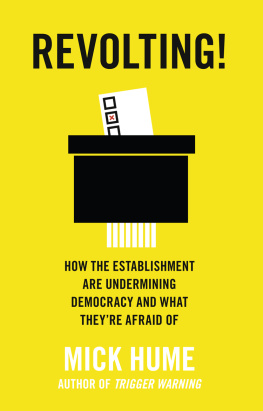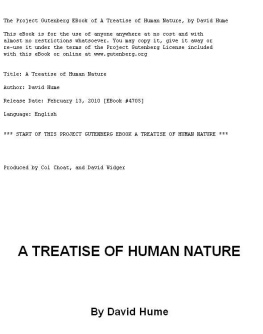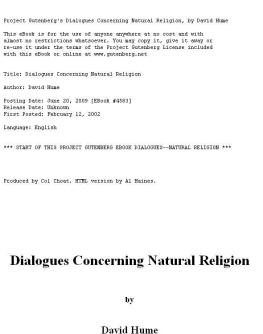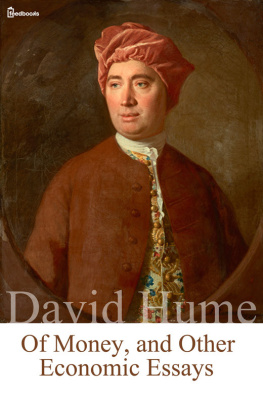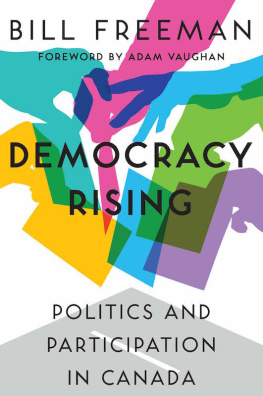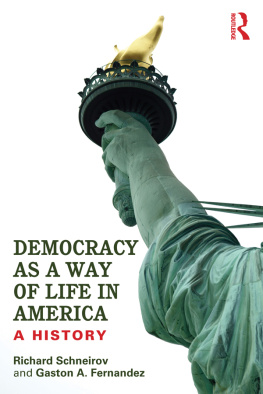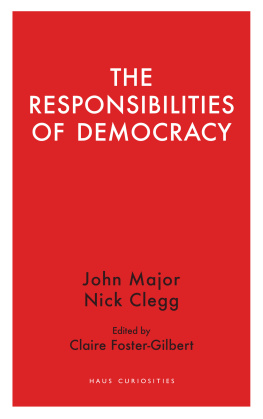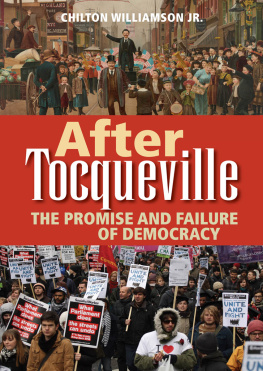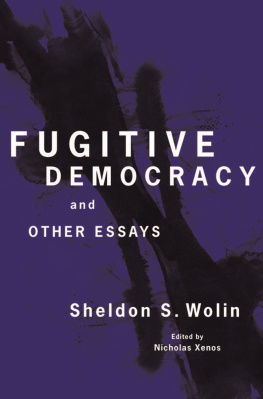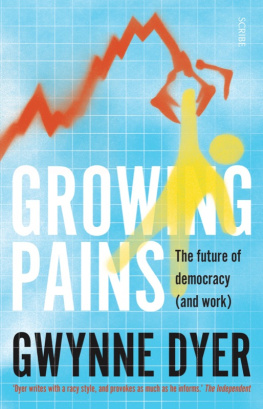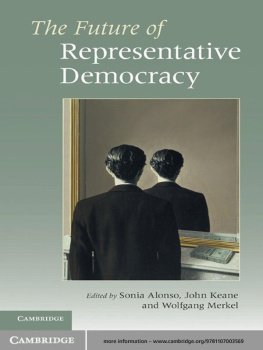William Collins
An imprint of HarperCollinsPublishers
1 London Bridge Street
London SE1 9GF
www.WilliamCollinsBooks.com
This eBook first published in Great Britain by William Collins in 2017
Copyright Mick Hume 2017
Mick Hume asserts the moral right to be identified as the author of this work
A catalogue record of this book is available from the British Library
All rights reserved under International and Pan-American Copyright Conventions. By payment of the required fees, you have been granted the non-exclusive, non-transferable right to access and read the text of this e-book on-screen. No part of this text may be reproduced, transmitted, down-loaded, decompiled, reverse engineered, or stored in or introduced into any information storage and retrieval system, in any form or by any means, whether electronic or mechanical, now known or hereinafter invented, without the express written permission of HarperCollins.
Source ISBN: 9780008220822
Ebook Edition February 2017 ISBN: 9780008220839
Version: 2017-01-31
For Ginny, my wife one in 17.4 million
Contents
This short book was conceived and written after the 2016 referendum on the UKs membership of the EU, and the US presidential election. But the idea of writing a polemical defence of popular democracy against its modern enemies did not occur to me overnight.
For some time, I had been aware of the widening gap between the rhetorical support for democracy in Western societies, and the attempts to restrict it in practice. And I had become particularly concerned by the Western lefts effective abandonment of the defence of democratic freedoms.
Similar concerns motivated the writing of my previous book, Trigger Warning: Is the Fear of Being Offensive Killing Free Speech?, to which Revolting! can be seen as a companion, if not a sequel.
In contrast to todays state-centred leftism, the British left-wing tradition with which some of us identify has always taken the fight for democracy and free speech seriously: from the Levellers to the radical wing of the Suffragettes.
Those who believe in progress have fought for more democracy and freedom, not just as a good idea or an end in itself, but also as the means to help change the world. The lefts abandonment of those historic causes marks the end of that era.
The need now is to bring the politics of democracy to life and start a new public debate about the sort of society we want. This book is intended as a contribution, and a call to arms.
Revolting!s argument for more democracy has been developed through my years as a campaigning journalist in both the mainstream and alternative press, not least as the editor of Living Marxism magazine from 1988 (relaunched in the 1990s as the taboo-busting LM until it was forced to close after being sued under Englands atrocious libel laws in 2000), and then as the launch editor of Spiked (spiked-online.com), of which I am now editor-at-large.
Like anything to do with mass democracy, however, this book is no solo effort. It would not have been possible without the contributions of others. I want to extend my thanks and admiration to my hard-working colleagues at Spiked Tom Slater, Tim Black, Viv Regan and Ella Whelan, led by the inimitable editor Brendan ONeill. They are true pioneers breaking new ground in the struggles over democracy and free speech.
Although this book is critical of the way that experts are now empowered to give orders rather than advice, it is itself reliant on the invaluable expertise of other writers and historians, past and present. I am indebted to the work of Bruno Waterfield and James Heartfield on the European Union.
Thanks are also due to Joseph Zigmond, my editor at William Collins, for helping to make the idea behind Revolting! into a reality. Finally, I would like to offer sincere thanks to my old friend and collaborator Frank Furedi, for the inspiration and advice to focus on the arguments that matter.
When it comes to taking responsibility for the text, warts and all, I remain of course in a minority of one.
Mick Hume, London, February 2017
This is not a book about Brexit. Nor is it a book about the election of Donald Trump. It is about a much bigger issue one the debate around those extraordinary events has highlighted. Whats at stake is the future of democracy itself, in the UK, the US and across the West.
We live at a strange moment in the history of democratic politics. Today, perhaps for the first time, every serious politician and thinker in the Western world will declare their support for democracy in principle. Yet in practice the authorities are seeking to limit democratic decision-making and separate power from the people.
They invest authority instead in unelected institutions, from the courts to the European Commission. Elected politicians act as a professional elite, divorced from those they are supposed to represent. And everywhere, the intellectual fashion is to question whether voters are really fit or qualified to make democratic decisions on major issues, such as membership of the European Union or the Presidency of the United States.
Ours is the age of Im a democrat, but , when the establishment insists it is all for democracy, but only in moderation; it just cannot tolerate what one former member of President Barack Obamas administration calls too much of a good thing, suggesting that America might be a healthier democracy if it were a slightly less democratic one. For some in high places these days it seems that, where democracy is concerned, less really can be more.
It is an attitude captured in the UK by former Conservative prime minister John Major who, dismissing the suggestion that the Brexit referendum result should be binding, declared that the tyranny of the majority has never applied in a democracy. Some of us might naively have imagined that majority rule was the essence of democracy. But not, it seems, when millions of common tyrants vote against the wishes of the minority political elite.
It is time we started not only to defend popular democracy, but to argue for far more of it, with no ifs, buts or by-your-leaves.
So this is not just a book about Brexit, or about Trump. The best place to begin the argument, however, is with the fallout from that UK referendum and the US election, which has brought the bigger picture sharply into focus. Whichever side you were on in those votes, the wider issue of your right to decide is now on the line.
In Animal Farm, his 1945 allegorical novel about the Soviet Unions descent from popular revolution to Stalinist tyranny, George Orwell gives one of the great definitions of the betrayal of democracy. It becomes clear that the farm has turned into a totalitarian system when the powerful elite of pigs alters the founding principle of Animal Farm painted on the barn wall. To the noble declaration All Animals Are Equal they add the qualification But Some Animals Are More Equal Than Others.
Of course thats only dystopian fiction from 1945, in the faraway era of world war and totalitarianism. Even Orwell originally entitled it Animal Farm: A Fairy Story. It couldnt happen here.
Fast-forward to September 2016 and the director of the pollsters BritainThinks goes on BBC Radio 4s flagship morning Today programme, to discuss the findings of their focus-group conversations with voters from both sides of the June referendum on the UKs membership of the European Union.
Deborah Mattinson reported that some of the victorious Leave voters think the Remainers are rich people who had benefited from the status quo within the EU. Something of a generalisation no doubt, but fair enough, perhaps. That argument at least acknowledges that those Remain voters had made a reasonable decision that might be seen as in their own self-interests. Think-tank research did find that, in the words of one Tory newspaper, Britains ruling classes were the only group to vote overwhelmingly to stay in the European Union.

